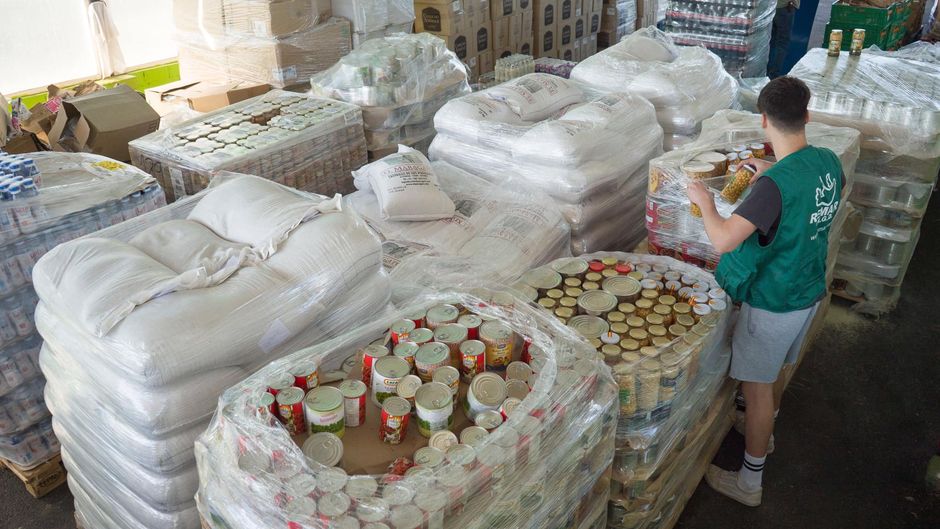Responding to the Covid-19 hunger queues in Spain
A report of the Spanish public TV shows the social action of evangelical associations during the pandemic. “We put the five loaves and two fish, and the Lord has multiplied them”.
Buenas Noticias TV · MADRID · 03 MARCH 2021 · 16:00 CET

The coronavirus crisis continues to worsen the Spanish economy. Its unemployment hits 4 million for first time in 5 years, according to figures released this week by the Ministry of Labour.
Most of the nearly 37,000 workers who lost their jobs in February were in the service sector. More than twice as many women as men lost their work during that month.
Furthermore, Spain also still has 900,000 people on furlough schemes. The data released show that 63% of people who work in hotels are in such schemes, as are many travel agency workers (57%), and over 40% of workers in the industries of food and air transports.
The pandemic is also hitting Europe severely. Eurozone GDP shrank 0.7% in the fourth quarter.
“Growth in the first quarter of this year, and perhaps the second, will be relatively weaker than expected, but by the second half of the year, if the vaccination goes as we hope, we could see a noticeable rebound in activity”, said the Vice President of the European Central Bank, Luis de Guindos.
Difficult and bewildering beginning
Since the beginning of the pandemic, the number of people in Spain who have lost everything they had has grown, and the so called hunger queues are increasing, so that social action has multiplied to respond to the growing demand for assistance.
There are many evangelical ministries, churches and individuals among the volunteers who started to help those in need when the crisis began, continued during the strict lockdown, and remain very active today.

Volunteer of Mision Urbana prepares oxex for peoplein need. / Facebook Mision Urbana A report of the evangelical programme Buenas Noticias (Good News) in the Spanish public television TVE, has shown the work of some of those groups.
“We could not close the doors. We had 500 families without resources. We already had soup kitchens open, but with the pandemic we had to change our way of doing things. We couldn't feed them at the tables but we gave them hot food in cartons, so that they could take it home”, tells Mari Carmen Jimenez, a representative of the evangelical NGO Remar.
Pablo Lopez, a leader of the social work of the evangelical Christian community Eben-Ezer in Madrid, recalls that “at first we were bewildered, because the government said that nothing was happening here, but then everything was closed, so we decided to get down to work”.
As the state of emergency was announced in Spain in March 2020, “we were only one week without food distribution, until we got organised. Previously, we were helping 300 families. But in just over a month, the number doubled”, adds Lopez.
The “Da vida” (Give Life) centre of the evangelical NGO Misión Urbana (City Mission) in Madrid, provides care for pregnant women and children up to the age of three. "In April, when we had been confined, isolated, separated, without seeing anyone for a month, we decided to open”, says Raili Waris, one of the social workers of the centre.
“We called on for volunteers and it was really surprising how many volunteers came forward to help, putting ourselves on the front line, facing fears and risks to open the centre”, she underlines.
“The Lord has provided”
Despite the initial confusion, all the evangelical volunteers emphasise how God has provided in every step of the way. “We had to get hygienic material; masks, which were then at an exorbitant price; transportation, and the Lord provided the funds for all that, for this year and to continue with it”, points out Lopez.
“Jesus was with us, giving us strength and group cohesion. We found strength together in prayer and in encouraging one another […] Whatever we asked God for, He answered. We have not been afraid, we felt a lot of love and joy”, says Waris.
The representative of Remar underlines that “it is a satisfaction to have seen God's abundant provision and the caring hearts of so many who have helped us, above all, we thank God that we have not lacked anything”.
All of them are also grateful for “the donations from organisations, private donors, churches”. “When a company, a supermarket, a bar, a school closed down, they all brought us food”.
“When there is a need, the church must be there”
Almost a year after the beginning of the pandemic, “there are many people in need and we have to be there, with our hands open and ready. When there is a need, the church must be there, showing the love of Christ”, stresses Jimenez.
“We have had to redouble our efforts, doing a lot of things that we didn't do before. We continue to work hard because it has to be like this, we cannot stop attending to all those families who really need it”, points out Lopez.
The volunteers of Mision Urbana “continue with the same strength, the same enthusiasm and a greater commitment to help”.
“We have put the five loaves and two fish and the Lord has multiplied them. We just thank God because we are here, we are still standing and we can go on”, Jimenez concludes.
Published in: Evangelical Focus - life & tech - Responding to the Covid-19 hunger queues in Spain
